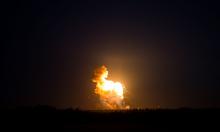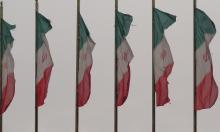Saudi Arabia Puts Out White Flag
Saddam lost the most influential Arab ally
Saudi Arabia may take a decision concerning its participation in a military operation against Iraq depending upon evidences provided by the UN inspectors, Saudi Foreign Minister Prince Saud Al Faisal told journalists Tuesday.
He stressed that Saudi Arabia would like to settle the crisis in Iraq peacefully and avoid conflict even if the UN sanctioned a war. The minister said: “If the United Nations asks Saudi Arabia to join, depending on the material breach that they show and depending on the proof that they show, Saudi Arabia will decide.”
“We are interested in peace and searching for a peaceful solution to the crisis. And even if the United Nations decides on war, we want them to give us a last chance to exert efforts for peace,” Prince Saud Al Faisal emphasized. He also declared that until recently, the USA never asked Er Riyadh to provide military objects for an operation against Iraq.
Off-site observers may say that today’s statement pronounced by the Saudi foreign minister is not new at all, as Saudis used to speak in practically the same manner even earlier. And nothing different can be expected from them. It may be so, but…
Er Riyadh is Washington’s closest friend in the Arab world: Saudi petrodollars secured upsurge of the American economy within decades; Saudi Arabia also provided its territory for an attack against Iraq during the Desert Storm operation.
The situation changed on September 11 when financial support of terrorist organizations put an end to the old friendship. Washington was obviously disappointed that promises of Saudi Arabia to discover and block the sources of financing terrorists voiced after the 9/11 tragedy were never realized.
When Americans became aware of this fact, they immediately gave up their admonitions and got down to business: the US Administration developed a plan meant to exert pressure upon the government of Saudi Arabia in order to block sources funding al-Qaeda. The US National Security Council recommended President Bush to issue an ultimatum to Er Riyadh, in accordance to which financial flows coming from Saudi Arabia must be taken under control within three months.
Further, in July 2002 a political controversy broke out in the USA because of rather harsh statements of a Pentagon official concerning Saudi Arabia. The official delivered a report at an advisory board and said: “Saudi Arabia supports our enemies and attacks our friends.” He also called Saudi Arabia the center of evil and “America’s most dangerous opponent” in the Middle East.
The Department of Defense made haste to dissociate itself from the Pentagon official who made the statement, but the fact still remained. This was the first warning for Saudis signifying that the US press seized Saudi Arabia in a death grip. More and more accusations saying that Saudi Arabia supports terrorism are published in the newspapers.
As the psychological tension increased, 600 American citizens sent their writ to the federal court; the writ consisted of the list of 80 respondents blamed for financing Osama bin Laden and al-Qaeda terrorists. The sum of the suit exceeds one trillion of US dollars. The Saudi community flew into arage when it learnt that members of the Royal Family (three princes), including Defense Minister Sultan bin Abdullah Al Aziz, were also on the list.
The list also contains several charitable and bank structures of Saudi Arabia, for instance Al-Baraka and Al-Rajhi Investment and Development. Er Riyadh decided to pay back and declared that within the nearest two months a group of public and religious figures closely connected with the Royal Family wold file 15 suits against American companies and governmental officials blamed for undermining the kingdom’s reputation.
Experts say that the American suit to the sum of one trillion dollars caused an unbelievable wave of indignation in the Saudi society concerning America’s politics with respect to the Arab nations. The mass media publish lots of anti-American articles. For instance, Er Riyadh’s Al-Riyadh, expressing the governmental position, comments: “We must review our relations with the USA and seek a possible alternative to the strategic union with Americans.” Appeals of this kind were also published in Al-Hayat owned by a Saudi millionaire.
The psychological war between the USA and Saudi Arabia has changed Er Riyadh’s foreign policy. The Saudi government prohibited the USA to use American military bases on the Saudi Arabia territory in case if a war was waged against Iraq.
Washington ignored the statement; moreover, it made a hint that the plan of peace settlement of the Arab-Israeli conflict suggested by Prince Abdullah attracted none of the USA’s attention. Thus, political influence of the kingdom in the whole of the Arab world was put into question. This is a very unbearable fact for Er Riyadh.
Adel Al-Jubeir, foreign policy advisor to Crown Prince Abdullah declared that he never expected to face such a violent criticism campaign against Saudi Arabia that was launched by the American press. He also said that Saudi Arabia would remain a vigilant partner to the USA in the struggle with terrorism.
What is more, Saudi Arabia informed US military men that they would be able to use the Saudi airspace, aerodromes and the key command post at the Prince Sultan’s airbase near Er Riyadh if a war against Iraq was waged. As it turned out, within the past two months, without any fuss, Saudis allowed US planes based on the Saudi territory to take off for patrolling Iraq’s banned territories and perform bombing in response to flak from the surface. Earlier, Americans used Kuwait aerodromes for this purpose. The Pentagon hopes it is not ruled out that finally Saudi Arabia will allow to use its sea ports and will let American and allied troops to operate on its territory.
According to the Arab diplomatic sources, a high-ranking Saudi representative visited Baghdad in December. He wanted to find out whether Saddam Hussein would agree to leave the country and live in exile.
Picture: US President George W. Bush and Saudi Crown Prince Abdullah
Dmitry Litvinovich PRAVDA.Ru
Translated by Maria Gousseva
Read the original in Russian: https://www.pravda.ru/accidents/34260-irac/
Related links:
Subscribe to Pravda.Ru Telegram channel, Facebook, RSS!





